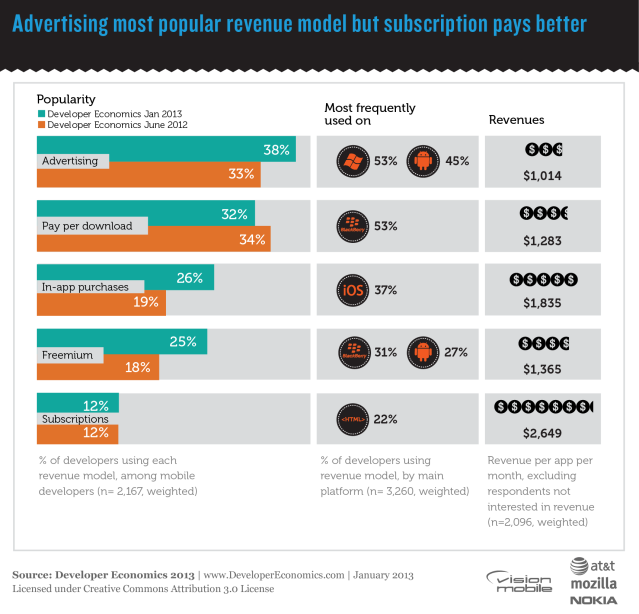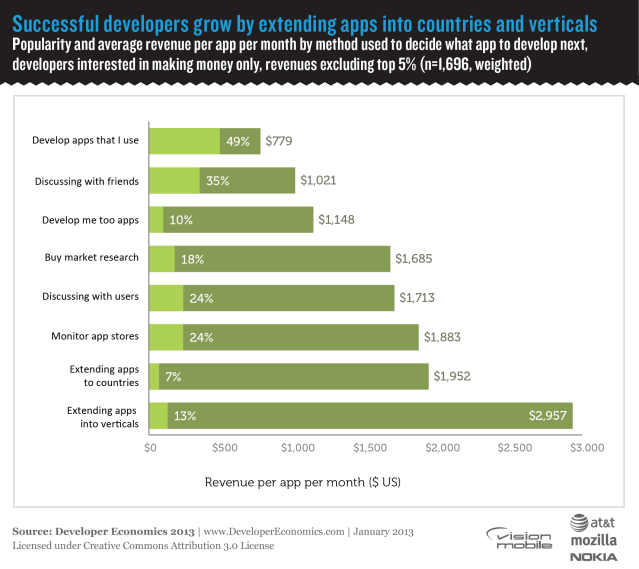
October 14, 2013
[VisionMobile’s Andreas Pappas was recently quizzed on app business models, best practices and strategies for developers and entrepreneurs. In this post we’re presenting the most interesting questions and answers from this interview. These are tough questions that all developers and entrepreneurs are faced with in the early stages of their ventures.]

Q1: I am thinking of developing my own mobile app: What are the main business models I can use to make money and how do I select the right one for my idea?
There are numerous factors to take into account when developing your business model but the two key questions you have to ask are:
-
What problem am I trying to solve?
-
How am I solving this problem?
Once you have answered these two questions, you will be in a much better position to develop a business model. A good place to start from is the Business Model Canvas, a simple tool that outlines the key areas that a business model needs to address.
A number of areas within your business model are interdependent. For example, your target market will initially be defined by the problem you are solving. Once you have identified your target market you can start thinking about revenue models, marketing, partnerships, distribution etc.
While it helps to get everything right the first time, it is most likely that you will need to adapt both your product and your business model several times along the way.
From an economics perspective, a large number of successful business models these days are built on two-sided networks and even multi-sided networks. These are usually services that connect businesses to consumers or consumers to consumers, such as, for example AirBnB and eBay type services. These models exhibit powerful network effects if they manage to scale up and allow owners to monetise either one side of the network (e.g. consumers or businesses) or both (e.g. commission-based) depending on the application.
[tweetable]When it comes to making money, there is a variety of revenue models available[/tweetable] and the selection is to some extent dependant on your business model, competition, target market, and exit strategy. There is no one-size-fits-all solution here.
Free services can scale up quickly but monetisation may be problematic. So if your business plan requires scale, think about indirect income sources such as advertising or even VC funding, to get you through the growth phase. Once you’ve achieved scale, an exit is an option you should consider: user acquisition is expensive and larger businesses will frequently opt for acquisitions rather than organic growth.
[tweetable]Advertising may be profitable but requires massive scale and even then, getting it right is tricky[/tweetable]. Advertising is more popular on Android and WP than on iOS, due to the fact that Android users are not as heavy spenders as iOS users.
Obviously app-stores allow developers to monetise their apps directly, via paid downloads or in-app purchases. The latter has become increasingly popular, particularly on iOS and competes favourably against paid-downloads.
Beyond these obvious ones there is a range of options that have to do with the type of app/service that one is providing. For example, apps offering content or services (e.g. news apps or some fitness apps) may utilise a subscription model. This app business model is not easy to pull off though – even popular newspapers are struggling to make money off subscriptions.

Q2: I am a mobile developer. Which sectors have the most potential in my country?
The good thing about mobile apps is the fact that the market is global and the costs and barriers to reach international markets are very low compared to other, more traditional businesses. So mobile app development should not be seen in the traditional way of “what works in my local market” but instead, from the viewpoint of “what works in the markets that I want/I am well placed to reach”. In short, any sector has potential in your country if your focus is international and it should be international-first.
While this change in mindset is critical, that is not to say that there are no opportunities locally. If one is developing apps that rely on local content or services (e.g. transport services) then highly localised content is required. So it may be easier for local developers to source and access this content, although this is not always the case.
One would think, for example, that local travel/tourism apps would be more successful since they’re optimised for each region. However, the most successful apps in this sector are global because they have scale. [tweetable]For most apps, scale is critical and thinking locally can only get you so far[/tweetable].
Q3: What is more difficult? Coding or marketing the app?
The consensus among developers says marketing. While adopting new languages, frameworks, SDKs and APIs may pose challenges, it is usually a straightforward matter of learning to use new technology. For most developers, marketing has been uncharted territory until the very first app-store appeared. Mobile marketing is quite a different beast to anything that was available before iPhone-era smartphones. Even digital marketing specialists may find the landscape too perplexing since the strategies, practices and even the KPIs are in constant flux. Constant experimentation (in other words trial-and-error) is one of the strategies most frequently used in order to find out what works best in your case.
Q4: What are the best ways to do marketing for my app and acquire users/downloads etc?
😉 See above. The best advice is to try several options and see how they work for your particular case. Before you pay for any advertising or promotion network, try some textbook marketing methods that are still of great value:
#1 Cross-promotion
If you have several apps, make sure you promote your other apps through them. Of course this must be done in a way that will not annoy your users. If you can promote your app through other apps, that’s also a good idea.
#2 Become part of an ecosystem/platform
Make your app work with other apps if this is an option. For example, if you’ve developed a fitness app that could work with Withings or Runkeeper, why not make it work with these and gain more visibility through their own ecosystem?
#3 Do some PR
Let people know about your app. Send emails or press releases to popular websites, newspapers and anyone with a sizeable reach. Most of them may not respond but it’s definitely worth a try and there are several success stories that started this way.
After you’ve done the above, there are plenty of options to try, depending on your marketing budget. If you have determined how valuable each customer is to you, then you can hire a mobile marketing expert to handle all your marketing activities and pay them per customer acquired.
Q5: What are the most common mistakes that mobile app developers do and how can I avoid them?
#1 Failing to see app development as a business
[tweetable]The best technology solution is not good enough without the right business models and execution[/tweetable]. This is one of the best known principles in the area of technology strategy. Developers that lack business experience often fail on the commercial side of the business.
#2 Failing to prepare for success
The nature, scale and pace of the app economy is such that in a matter of days your user based may grow from tens to tens of thousand users. Will your back-end cope? Will you be able to pay for third-party API calls utilised in your app? If not, what may have been initially a great service, will fail due to poor customer experience or you may run out of money. A proper business case should anticipate success.
#3 Failing to pivot/adapt
A common advice in the startup world is “pivot till you die”. If your idea is not working try applying it on a different market, adapt it to the current market, flip it on its head or scrap it altogether and go for something else.
#4 Failing to know and listen to your users
In a market where consumer switching costs are so low and a user can easily replace your app with the competitor’s app, user experience and customer support are critical success factors. Your app will be deleted if it crashes repeatedly, if it is poorly designed, or does not deliver what it says on the tin. Test your app, test it again, use crash-reporting and user-analytics services and keep it up to date, implementing new features and listening to user feedback.
Q6: Is it better to try to innovate with a never-seen app, or is it better to be a follower?
Neither is easy and both can work. The advantage of being a follower is that you learn from others’ mistakes and failures. You may for example see what is not so good or what is missing from an app and fill the gap, or extend it into another market. The downside is that by the time you do it, others will probably be trying to do it too, so there will be more competition. You don’t just need a better app, you also need better execution, i.e. a better business model and marketing, in order to topple the leader.
On the other hand, a new, innovative idea can take you a long way before the competition catches up (although never at a safe distance) but it is more difficult to create a niche and then expand it.
[tweetable]While most developers develop apps they want to use themselves, this should not be the only criterion for developing your ideas[/tweetable]. At the very least, discussing with users, friends or researching the market can get you a long way.
Those developers that extend tried and tested ideas into new markets are usually more successful. That doesn’t mean that you can just copy an app; you have to adapt the business model to the new market at the very least. In the app economy innovation is not limited to technology but extends to business models too.

Comments? More advice? Feel free to start the conversation.
Andreas Pappas
Follow me on twitter @PappasAndreas
Recent Posts

August 27, 2025
How to Find the Right Learning Path When You’re Switching to a Tech Career
See post

August 27, 2025
The Hidden Challenges in Software Development Projects: Key Insights from Our Latest Survey
See post

August 22, 2025
Developer News This Week: AI Speed Trap, GitHub Copilot Agents, iOS 26 Beta Updates & More (Aug 22, 2025)
See post